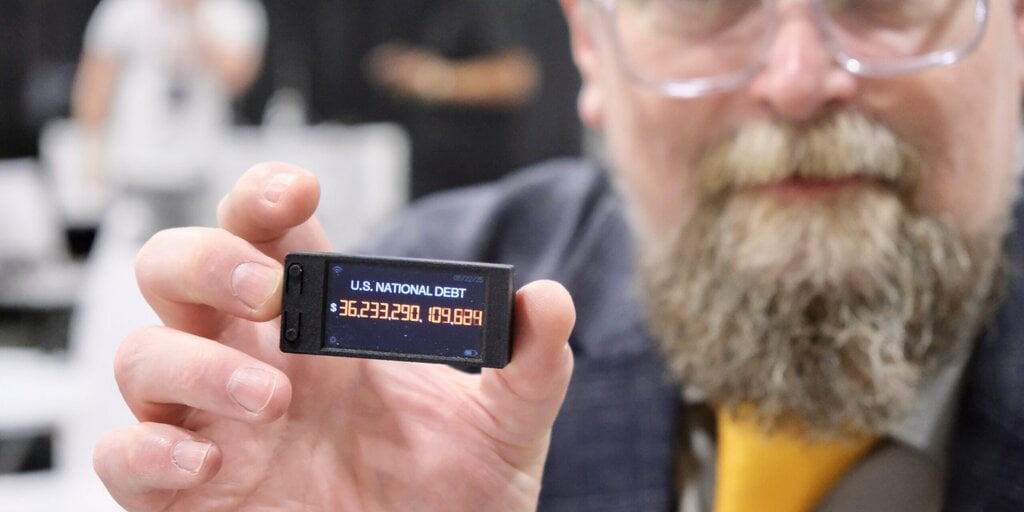In brief
- New Hampshire Rep. Keith Ammon (R) is a Bitcoin-friendly politician.
- He thinks Bitcoin could shield the Granite State from inflation.
- U.S. debt has reached unsustainable levels, he says.
When it comes to stockpiling Bitcoin, U.S. states aren’t just racing against each other, according to New Hampshire Rep. Keith Ammon (R). He believes that they are also competing against the federal government, which will be forced to print money to limit the impact of ballooning U.S. debt.
In an interview with Decrypt, Ammon said that states should be closely tracking the amount of money that the federal government has borrowed to keep Washington humming. On Thursday, that sum totalled roughly $37 trillion, according to the U.S. Debt Clock.
Ammon carries a small device in his pocket displaying that metric, which updates by the millisecond, growing by the thousands.
“The state is tied to this debt because we are tied to the U.S. dollar,” he said. “The only way out of this debt is for the federal government to print more money [and] devalue the currency, so that this debt isn’t worth as much over time. That’s what every government does.”
Earlier this month, New Hampshire became the first U.S. state to sign a bill into law enabling it to start accumulating Bitcoin. A day later, Arizona passed a similar initiative. Texas could also be on the precipice of establishing its own strategic Bitcoin reserve, yet several states have rejected Bitcoin-related bills since the White House began moving in that direction.
“That’s a big state,” Ammon, who first became a member of the New Hampshire House of Representatives in 2014. “I just think it would snowball from there.”
Ammon is among lawmakers that increasingly view the U.S. debt levels as unsustainable. Republican Florida Sen. Rick Scott recently opposed U.S. President Donalds Trump’s Big, Beautiful Bill this week, namely because it does not do enough to reign in massive deficits.
Ammon proposed his Bitcoin bill as a way to shield the Granite State from a constant decline in the dollar’s purchasing power. Fiscal policy is largely a national issue, but Ammon has seen the impact of poor management firsthand, down to the county level.
“Every budget is blown out because the purchasing power of the U.S. dollar has eroded 25% in the last four years,” he said. “If a state is going to survive, it’s got to figure out how to navigate that.”
That doesn’t mean New Hampshire is going all in on Bitcoin with its pension plans and trusts. Ammon’s bill empowers the state’s treasurer, charged with overseeing revenue and finances, to allocate a small percentage of resources to Bitcoin that’s constantly rebalanced. Taking on too much risk could affect the state’s overall credit rating, he added.
“If you go off like Yosemite Sam, putting everything into Bitcoin, that rating is going to drop, and then your cost to borrow money is going to go way up,” he said. “You want to have a little bit of risk, but not so much.”
Edited by James Rubin
Daily Debrief Newsletter
Start every day with the top news stories right now, plus original features, a podcast, videos and more.

